Iyabo Ojikutu's Blog, page 8
September 18, 2017
Choose Depth over Quantity
One of the greatest lessons I've learned over the years is that quality is much more important than quantity. Of course, this applies to things. Better to buy a pair of shoes that will last a
long time than to buy several that will rip apart in a few weeks. Applying this to things is easy to comprehend and basically common sense. However, when applying this to intangibles like
relationships and everything that comes with them, it gets to be a struggle.
It gets to be a tug of war of emotions. Emotions ranging from trying not to hurt anyone, still wanting to fit in, to not be viewed as selfish, as a loner, as eccentric, or simply feeling insecure
without the gang behind and around you.
As time goes on, if we have gained some wisdom and have been intuitive in life, we realize it is not the number of friends, coworkers, and even extended family members that determine our life
paths.
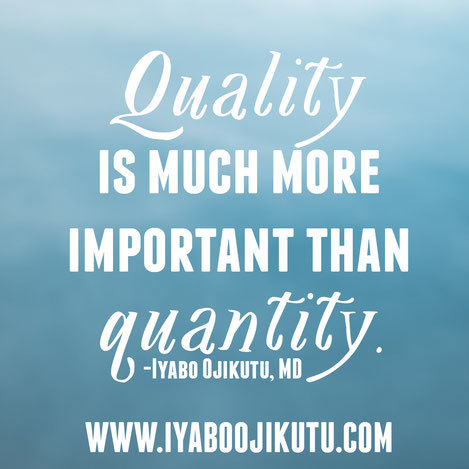
But the depth of character and qualities they carry.
Sadly, it sometimes does happen that the seemingly closest people to us eventually end up being the ones we may have to drop from our “circle of depth.”
Sometimes, it ends up being family members who are now more of a constant negative influence, or close friends who pull you down, or sadly, sometimes it is a spouse or lifelong partner.

But holding on to negativity, to shallowness of character, to people who dwell in the past, who find it hard to see the good in life or the good in people, who get antsy with change, who are
consumed by external influences rather than working on their own internal power, will do nothing but drain you of your own self-worth.
This ability to decipher people with character depth from the shallow ones is something we must all have in order to find and remain in our flow. The natural Flow of Life where we thrive the
best.
People around us contribute immensely to our state of Flow.
So we must be very wise to notice those who throw us off that state.
Having a sense of community builds us up, helps us influence one another, and eventually strengthens world alliances.
But on the other hand, remaining around negative community is detrimental to our life purposes.
Some of us get so used to being around people without depth for so long that we start to become like them. We get sucked into their mentality and eventually lose our paths and places in life.
What a waste of what could have been a forward-thinking and useful member of society. Just because of the effect of other humans.
Choose depth of character; choose steadfast behavior; search for forward thinkers. Let go of the quest for the quantity of your associations.
Redefine your focus in life, and be permanently happy.
September 15, 2017
What Does This Experience Mean?
Joy and triumphs bring us lessons. Pain and sadness bring us lessons. If both life extremes bring us something valid to learn and if they grow us as individuals, then why can't we just accept
them as such?
Why do we as humans find it difficult to grasp the real meaning in all life situations?
We only seem to find meaning when good things happen.

Here are two examples:
You finally buy or build your own house—you get full of elation and credit yourself with hard work and resilience and good money management, and you tell others that lesson.
You lose your job. You blame it on your boss, on the organization, on your coworkers, sometimes even the government and the world for being unjust because of who we are.
But we forget what our role was in the firing. What did I do wrong in my job? Could it be all the frequent tardiness to work? Perhaps it was because of using my cell phone at work? Or the lack of
customer skills I portrayed?
If everything that happened to us was good and lovely, how would we learn lessons, grow, and become better? How would we become more resilient, more determined, and more optimistic?
The trait of optimism is developed through failing and then winning again.
If you don't fail at things first, or work hard and put in everything you can to succeed, you will not be an optimist. You will just remain complacent, self-righteous, and self-centered.
If you visit your doctor and you get a report that your cholesterol is high, or your blood pressure is high, or you're developing pre-diabetes—that experience means you have to make changes in
your lifestyle.
If you lose a loved one, that experience is a reminder no one is here forever, and you must live your life better. We must make the best of the time we are granted every single day.
If you miss your flight, you'd better wake up earlier and plan your time more efficiently next time.
If you fail your exams, study harder. It's you, not the professor's fault.
If you get pregnant out of wedlock once, that experience is teaching you to abstain from sex or use birth control and avoid having more precious kids outside of a stable home.
If you get into debt, watch your spending and drop the materialism.
The list goes on and on. Every experience has a meaning. Every experience has a lesson.
And the lesson is for you. Not for the other person.
This is common in relationships—friends and marriages and work situations (as described above with a loss of job).

If you get a divorce, look for the lessons you gained from the marriage and the divorce process itself. Don't point fingers. You will only grow as an individual, learn good lessons, and flourish
in the future if you focus on what you learned.
If all you're ranting about is what the other person did to you, you will remain stuck, depressed, unhappy, demoralized, and in bondage.
Just ask yourself this: "What does this experience mean for me?" And the answers will come rushing in. Remember to write them in your journal as they come to you. You'll need to read them over
and over to continue your life growth.
May we become permanently happy by learning lessons from all our experiences.
September 13, 2017
Balancing Obedience and Independence
Life is a revolving door. A roller coaster of decisions. Am I in or out? Should I stay or go? Should I change careers or not? Should I tell her/him or be quiet? Should I begin this project or
not? Should I sign this contract or wait it out?
Decisions are tough because they always involve others. If we lived in a bubble and decisions we made only affected us, life would be much easier.
It usually boils down to this: Should I be independent and go with my own decisions, regardless of what those around me think? Or should I be obedient and go with others' decisions, or at least
come to some compromise with them?
The world is made up of human interactions and relationships.
We have to preserve some relationships obviously, so we can be thriving and fully existent humans. We can only thrive if we support and are supported. Love and be loved back. Influence and be
influenced back. Care for and be cared for in return. All these must be positive, growing, and forward-moving interactions for all parties.
But we do not need to hold on to relationships that are continuously negative just because of…this reason, that reason.
No reason is good enough for staying in a relationship or partnership that is destructive to your soul, pulls you down, keeps you up at night, gets you emotionally and physically sick, and
basically gets you out of your natural flow of life. The flow of life is that state where you are living effortlessly, where you don't notice time passing by, and your gifts and talents are
manifesting, and you feel peaceful.

My rule of thumb is no adult above the ages of 18–21 should continuously get you out of your flow. We are all flanked by our own lifelines, and we can only change ourselves. If you stick around
in obedience hoping and aiming to change the other party because you’re in a dysfunctional and negative relationship, you are wasting your time. Or even if you don't have the intention to change
that person but are waiting it out hoping things will magically get better, despite the fact that the person is repeatedly showing the same traits, you are wasting your time.
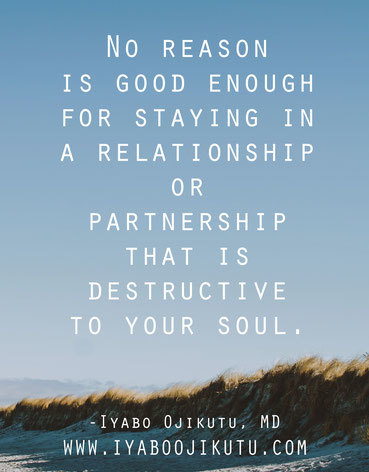
So if being obedient means giving in to continuous negative and abusive behavior from them just so that everyone is “happy,” so the kids are okay, so family doesn't think you’re impatient, or
because it's culturally right, or because you are afraid you can't survive without them, you're completely sabotaging your state of mind and subsequently your life purpose.
Which brings me to this: If your flow and life purpose are tightly linked to someone else's, it is time to reevaluate your life. If your ability to carry out your life purpose is dependent on
someone else's, you need to ponder your decisions.
Obviously, there are exceptions here. Our children 0–18/21. Disabled family or friends. I mean physically or psychologically disabled. Not excuses or spiritual and emotional imbalances. You are
not responsible people who are having trouble with keeping their overall lives in balance.
Juggling obedience and independence is a balancing act we all have to face from time to time in life. It hits us in all directions at some point—nuclear and extended family, friends, coworkers,
business colleagues. If it is an adult constantly getting you out of your flow of life, you have a very important decision to make. Sorry to say, but you will have to make the tough decision to
“Let go and Let in better.”
Better—what God planned for you.
Look for your flow of life, learn how to remain there, and be permanently happy.
September 11, 2017
What Is Constant in Your Life?
Relationships change. People change. Families change. Health changes. Your body changes. Your vision changes—I started wearing reading glasses at age 32. Now I need bifocals, and I'm always
looking for the prescription that gives me the best vision! Lol. Children also move on. Careers change.
At 47 years old, I'm now fully aware and conscious of the fact that the only constant in my life is God. The Divine. The Creator of the universe. The Prince of Peace. He never changes. As long as
I have breath, there will be those two constants—myself and God.

So if we already know that as long as we are alive, only God is constant, why do we get frazzled, heartbroken, sometimes depressed when everything else changes? When we are disappointed by
people, family, loved ones, spouses, careers, our bodies, why do we put so much energy and so much of our souls into those circumstances instead of looking inward and upward?
Inward—into your own spirit, and upward—to God is where the answers, the strength, the power, the Peace, and the freedom lie.
Of course, we must do our parts in making our lives as balanced as possible. We must savor each day, take care of ourselves spiritually and physically, be a light to the world, and make the world
a better place.
But in doing our parts in the world, we must not get into the cycle of despair and disappointment when humans fail us—because they will. We must respond in love (sometimes love from a distance,
if necessary) and create appropriate boundaries so that our lives remain in balance.
Everything, everyone, every circumstance in life is subject to change. Only God is constant.
Our physical bodies will age. Our spirits were created to remain ageless, but this is up to us.
If we always look up to and invite God, the constant, our spirits will never age.
And the beauty and wonder of this truth is, as our spirits remain young, ageless, and pure, this reflects on our outer beauty also.
As we get older, most of us get this truth, that only God is a constant.
So my hope is to reach the youth, the young’uns who often place their entire souls on other humans and often end up dejected and depressed when they realize humans will change.
I also hope those of us in middle age and beyond who need to be reminded of this will ponder it seriously.
Only you and God are constant.
Write this in your journal:
"Thank you, God, for being the only constant in my life. Thank you for always watching over me. Thank you for your unconditional love."
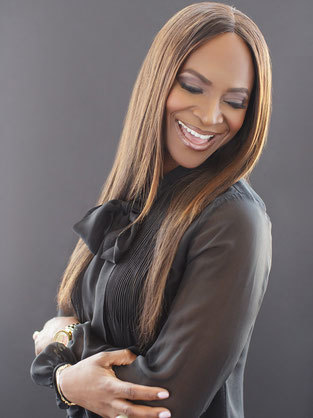
May we be permanently happy by looking inward and upward first. Then we will do much better outward and around.
September 8, 2017
Be Silent So You Can Get Louder
I did not realize silence had so many advantages.
That the act of not talking, of being quiet and still could make you so much better at life.
That making time for solitude helps you reconnect with yourself, think deeply, boost your creativity, and find peace and happiness and clarity.
Silence, quiet, and solitude also reduce stress, and less stress means less inflammation in our bodies and makes us healthier.
Spending time alone improves concentration, intellectual capacity, problem-solving skills, work productivity, and even relationships.
Spending time alone, in silence, actually makes your life louder.
Louder in a good way, because the more quiet time you enjoy, the better you get at living life, discovering your voice, finding your life purpose, and noticing your gifts and passions.
As I experienced the benefits for myself, I could not believe how good it felt. I started to look forward to times of solitude. Early morning is my time. I wake up, stay still for a few minutes,
not thinking of anything. Then I pray, write in my journal, say my affirmations, and sometimes get still again and empty my thoughts one more time before I get up. This really prepares me for my
day. If I occasionally forget and rush out of bed, I feel the difference in the way my day goes. If I don't get that calming effect and clarity first thing in the morning, my day is thrown off.
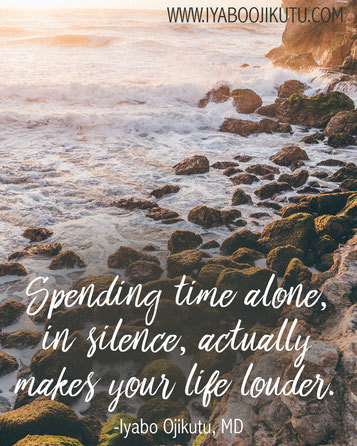
I schedule alone time just like I schedule my work time. Aside from early mornings, I have quiet time in my office at work during lunchtime. I shut my door, and the staff know not to knock unless
it's an emergency. I often will take a walk outside alone during my lunchtime, even if it's just for 5–10 minutes.
My kids know and respect when I need time alone. I let them know I'm going to have quiet time, and I shut my door and write, or I just sit in silence and empty my mind of all thoughts for a
while.
If you are living a chaotic life and you just can't unwind, and your days are a never-ending go go go, you must start to be intentional about scheduling alone, quiet, still time just for
yourself.
You'll be glad you did. Look at all the advantages listed above!
September 6, 2017
Read Well, Write Well, Think Critically—Succeed in Life
As a child, I knew the importance of reading books, studying hard, and passing my exams. I read a lot of big science, math, and medical books in my school and college days, and currently do so in
my physician career.
I had to in order to pass my exams and gain the knowledge I needed to equip me to practice medicine.
Formal education is important. We all have to read big books to pass our exams. Reading is enlightening. It takes us into the unknown, into people's souls. We visit other countries in our minds
by reading. We travel and imagine other worlds. We gain knowledge of science, math. We increase our vocabulary. We spell better, write better, problem solve better, gain more self-confidence, and
we even become less judgmental of others.
Reading well leads to writing well. The more you read, the more you learn and the more critical your thinking becomes. Your knowledge base increases so much that you are open to many more
opportunities in life. Your voice becomes stronger.

We could completely change this world if everyone has access to high-quality formal education. It could solve so many of our problems, especially those related to lack of opportunities and human
divisions.
Aside from my school and college books, I did not have much time to read other books (or maybe I just did not make time) until about eight years ago, when I felt a shift in my life and
experienced a new curiosity about life. I yearned to learn more about other people—their life stories, their life purposes. I read books on spirituality, pursuit of peace and happiness, religion,
memoirs, biographies. As I read more and more, I wrote more in my journal. My mind became more open, and I developed more critical thinking. I was more peaceful and started to see the world and
my own life a lot differently. I gained clarity on many questions I had.
At any point in time over the past five years, I have had at least three to five books on my iPad that I am reading simultaneously. I read mostly nonfiction.

Reading has propelled me into a world I could not have imagined. I believe doing so much reading was part of my inspiration to write. You have to spend time being quiet in order to read, and this
quieting of my soul, opening and cleansing of my heart and soul space, brought out a dormant gift—the gift of writing.
Do you read books aside from your school/college/career books? How much reading do you do? What is the last book you read? How has reading changed your life?
If you don't consider yourself a reader or you totally dislike reading, I want to encourage and even persuade you to start reading.
You are missing out on a lot in life by not reading. We now have so many options—e-books, audio books, books in so many languages. There is really no more excuses to not read.
If time is your excuse, I know you can carve out one hour a day to read. Sure you can.
Trust me—reading will change your life in amazing ways.
I read this on someone's feed on Instagram: “Money can't buy you happiness, but it can buy you a book, which will surely bring you happiness” (unknown source). I really loved this quote and wrote
it in my journal.
I'm also so honored to have a book program in my pediatric office. The Reach Out and Read program funds us with books for children six months to five years old, and we give them a brand-new
developmentally appropriate book at every wellness checkup. This is one of the most rewarding parts of my career.
Read. Write. Think critically. Pass it on to the younger generation, and we all succeed in life and find permanent happiness.
September 4, 2017
Is the Love of Money Really the Root of All Evil?
I've often pondered this. Why do we say the love of money is the root of all evil, when we need money for so many things in life?
Here are my thoughts:
We need money for life's basic necessities—shelter, food, healthcare, a good education, clothes. We need money to open new businesses, to lift our projects and life goals off the ground, to get
married, and of course, to help others.

I grew up in a middle-class neighborhood in Lagos, Nigeria. We had a comfortable home with most of life's necessities. Electricity was, however, never a constant. I grew used to almost daily
power outages, and I quickly became accustomed to doing my homework and studying for exam after exam with the flickering light of a candle or kerosene lantern and fanning myself with a cardboard.
My parents were averse to buying a generator—they were worried about safety—so I just had to make the best of the candles and lanterns.
Running water was also not a daily guarantee. We often walked a half a mile or so to fetch water for our daily needs.
We did not have cable TV growing up, but we had TVs in every room and could enjoy the local stations.
I grew up in a loving and nurturing family, and my parents showered me with all I needed morally, intellectually, and socially. I excelled in primary and secondary school and went on to medical
school at age 16 and graduated at age 22.
Of course, growing up I had friends who lived in the nicer neighborhoods on the “island.” Mansions, nicely manicured lawns and gardens, luxury cars, uniformed guards, massive generators that
turned on as soon as the power outages struck. I would marvel at all that luxury whenever I visited them, wondering what it would feel like living there.
I attended the same school, though, as my friends who lived in the posh area of town. My parents did not skimp on the best education. They owned a home in London, England, also, and we enjoyed
yearly summer vacations to London from when I was in primary school till I left Nigeria at age 23 to chase my own dreams in the UK. My friends on the “island” part of Lagos traveled a lot to
other countries as well, and we often met up in London.
So I grew up with the best upbringing any child could wish for. I had just what I needed to grow, thrive, and be a productive citizen of the world, minus any extra luxuries. Excessive money was
not needed to help fund my growth into an independent, forward-moving woman.
Through medical school, and meeting my spouse during residency in the UK, and then finishing my residency in the US, I started to dream of being wealthy. Dreaming of what my MD title could bring
me—the luxurious life, maybe a couple of mansions, luxury cars, multiple practices. In my 20s and part of my 30s, this was a big chunk of my focus. As I started to earn the bucks as an MD, wow!
It was time to dream big, work as hard as possible to live the dream! Dreaming and hoping to keeping up with the Joneses.
I am grateful to God and to myself that I quickly shifted from this thinking after a few years.
I realized the luxury cars and the dream of bigger homes and opening practices in every corner of the US was not my mission in life. With the shinier cars and the unrealistic dreams came more
problems, more strife, more unrest in my soul, more yearning for life's real meaning.
Why? Because I was placing my whole focus on owning bigger and cooler things and not on what my true life purpose was. Money was not buying me happiness. Instead, it made my life more complex and
confusing, and certainly made my family life more uncomfortable.
My soul started to shift. In my late 30s, I realized the love of money and things was not my life purpose. Finding peace, life's meaning, and influencing people positively started to take over my
focus, and I was so glad.
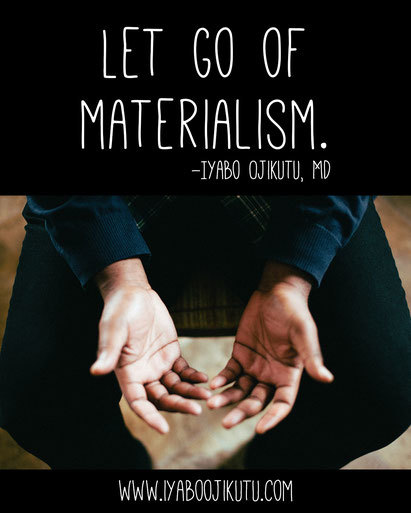
I became happier as I lived in an apartment with my daughters, lived a simpler life, read a lot of books, embraced quiet and solitude, took good care of my body physically and my soul
spiritually. I was saving a lot more every month. I cleared out all debt completely, my practice was growing exponentially, I was hiring new physicians and more support staff, I cut back on my
clinical time, and I had more time to myself. I became much more productive in every area of my life. I had time and resources for lovely experiences like travel and exploring the world with my
daughters, funding superior education for my daughters, and funding other opportunities that have come my way. With happiness and peace in my life came more clarity, and ways to become more
productive became so effortless.
I was getting into my real flow of life—the effortless way of living. My focus shifted from money and things to discovering my real purpose in life, and here I am, still on my journey but loving
the process, as I am now fully getting it, getting the reason I am here and realizing it does not start with the love of money and things—but it starts with reconnecting with yourself from inside
and then…what you need will follow you and be attracted to you.
1 Timothy 6:10: For the love of money is the root of all kinds of evil.
Are all your dreams still centered around getting richer, making the BIG bucks, buying the shiny things in life? Having bigger and better than your neighbors?
is, what your true life purpose is, to let go of the urgency to become
rich, and I can assure you that you will be a lot happier and more
fulfilled in life.
Yes, I do believe the love of money (not money itself but the love of it) and the urgency to be rich, acquire stuff, and keep up with the Joneses is the root of all evil.
Let go of materialism. Be permanently happy.
September 1, 2017
Be Vulnerable and Authentic, So You Can Truly Inspire Others
I'm really inspired by people who are authentic. Who show and expose their vulnerable side to inspire others. There are few I admire and love to listen to—Oprah, Tony Robbins, Deepak Chopra,
Iyanla Vanzant. They just seem real to me, and I've been inspired greatly by them. Their passion and fire shows through not only their words but also their body language. They are easy for me to
connect with. They come across as deep thinkers, not just cerebral thinkers, but really deep and philosophical. I've always been attracted to deep thinkers, storytellers, and thought machines.
They dig up my deep-thinking traits, and I just go along with them in my own world.
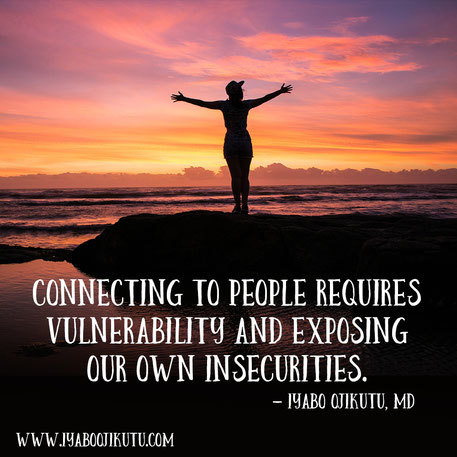
If you're always guarded, you will not truly connect to people, and you may limit your gifts and purpose in life. I'm not saying you should go out and tell everyone about everything in your
private life. No. Obviously we should be wise about what we need to share. It may be that you only share with trusted friends. It may be that you share with the world. The latter requires one
thing first—you must make sure you're completely at peace with sharing that particular thing, whatever that thing may be to you.
For example, don't share about your bad marriage and how it brought you growth as a person if you may be considering going back to that very marriage. Don't share about your struggles with weight
if you're not prepared for some backlash and opinions from different schools of thought. Some will call you vain. Some will say you're fat. Some will say even more hurtful things.
You have to be completely at peace with the insecurity and vulnerable side you're about to share before you share it.
It takes an invisible thick skin and complete peace in your mind about the story of yourself you're about to share. It takes forgiving yourself and forgiving the other party (parties)—if
applicable—before you share.
But I tell you, nothing is more freeing and more peace bringing than sharing your insecurities, vulnerabilities, and weaknesses. Why?
Because doing so creates a space in your heart for more goodness. You let go of those negative thoughts, and now you have space for positivity and growth.
Second, there is always someone out there who needs to hear what you're secretly going through, because guess what? You're not alone with those insecurities. Many people are experiencing the same
thing. Right now, at this moment. Hundreds, thousands, maybe even millions of people scattered all around the globe will benefit from knowing they are not alone. You can change the world by
exposing your insecurities while you're in the process of dealing with them or when you've dealt with them. Just whenever you feel ready and are at peace with sharing. When you won't be bothered
one bit by the naysayers and fault-finding people. Because those people will always exist in this world—there's nothing we can do about them.
If you've read my book, you'll already know about some of my struggles. The hardest ones being my driving phobia and driving
panic attacks. They came upon me in my early thirties out of the blue. Maybe because that time of my life was packed and very stressful? Maybe there was a genetic component? Hormonal? Who knows.
But they did happen, and they brought me a lot of grief, especially because even close friends and romantic partners did not understand what I was going through and said hurtful things. I tried
to hide my driving anxieties in many ways. Would give excuses, like my car was gone for servicing, or I just wanted to relax and be driven.
But when my writing gift came upon me, my soul was fully ready to expose this part of my life to the world. I was tired of the hiding, the excuses, and the bondage my phobia created in my heart.
Now I feel totally free from it, and I hope others who have the same struggle will read my book and know they are not alone.
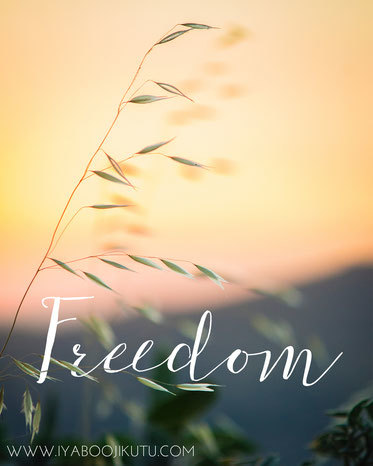
I have also completely forgiven the people who said hurtful things, because, I get it—it was my issue, and I had to find a way to deal with it. They were not me and really could not fully grasp
what I was going through.
So in case you're wondering, I go everywhere by Uber, and my older daughter drives me around when she's home. I have a full-time nanny / personal assistant who takes my 13-year-old to school and
for all activities.
I, however, do drive in our immediate vicinity. Luckily all my life essentials are close by—grocery stores, work-out places, and nail, hair, and other grooming necessities are within walking
distance and my driving comfort zones.
I do have to take Uber to work, but that's OK—I make it work!
Now, I actually love being driven around. It has brought me a lot of peace and happiness not having to drive myself around.
So be vulnerable, expose your insecurities when you're ready, and watch yourself find peace, and enter life's divine flow! And watch how many lives will tell you you've changed their lives for
the better!
August 30, 2017
Do Your Part to Eradicate Stereotypes
We cannot eradicate hate, but we can eradicate stereotypes by doing our own part in society.
The hate of others, and the consequences of hate, seems to be getting more and more rampant today. Hate is everywhere we look—in our friends’ lives and on the news, radio, and internet, and so
forth. We have experienced it too, and so have our children.
Growing up in Nigeria, I did not really know what stereotypes were. Everyone around me was black. There were a few Indians here and there, a few Caucasians, a few Middle Easterners, and some of
mixed race. But still, I did not really know of stereotypes.
I was aware of some tribal differences and unrest going on as a child between the three main tribes in my home country. Yes, some of this unrest was caused by stereotypical ideas, but not at the
level it now exists in our present-day world.
I am now more aware of this phenomenon because I moved from my mostly black country to the UK and then to the US.
I realized I was black when I first moved to England at the age of 23. I honestly did not realize my skin tone and my accent would be of such significance. I did not place any special
significance on the fact that I was black for the first 23 years of my life, but when I moved to another country, I was reminded, sometimes in quite obvious ways, sometimes more subtle ways, that
I looked and spoke differently.
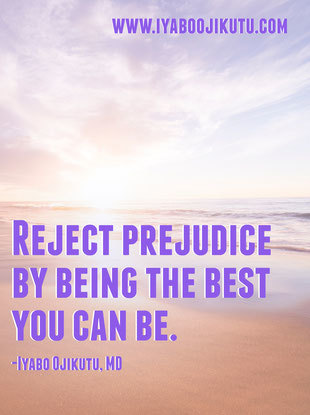
Do you have another name?
What is your English name?
Are you here to stay?
When are you going back to your country?
Do you guys have TVs and phones in your country?
Who taught you how to speak English?
You have an accent—where are you from? (Still not sure how to answer this question, because I still get it today, even now going on 20 years of living in the States. I'm from Lagos, Nigeria, but
am now a US citizen. I'm from Atlanta. I lived in the UK. Pretty long answer. If I were to count, I've probably answered this question a million times since I left Nigeria in 1993.)
You don't act or look like a Nigerian. Are you sure you're not from Jamaica or Barbados?
Q: Who do you work for? A: I own my practice.
Q: Are the doctors in your practice partners? A: No, they are employees.
Q: You pay those doctors? A: Yes, I do.
Q: You do? A: Yes, I do.
Q: Does the hospital own your practice? And on and on it goes.
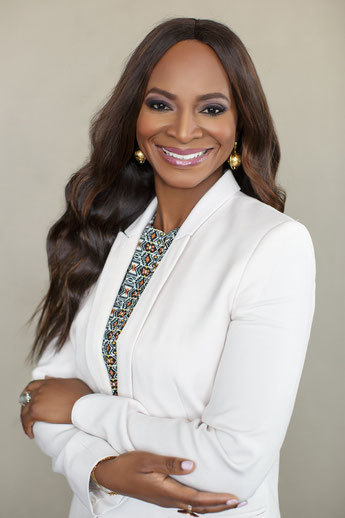
Patient is in room. I walk in—shocked expression on parent's face. “Oh, I thought you'd be a male Japanese doctor. Your name, Okuwobi, sounded Japanese.” First and last time. And they never come
back. This happened a lot in the beginning years of my practice in 2004–2006, before I had a website. Now, my face is visible, so I don't get the shocked faces any longer, and I'm guessing people
who come in have viewed me and are comfortable seeing me—hopefully.
The list goes on and on and on—the uncomfortable, awkward, and unnecessary questions and statements. The cross-checking of facts over and over. Yes, some questions stem from a natural curiosity
(those are obvious). But many, if not most, relate directly to stereotyping.
Since I left my country of birth, I have experienced some very uncomfortable feelings because of my skin tone, my accent, and my name, and being a woman, a female physician, a practice owner, a
single mom.
A stereotype is defined as a widely held but fixed and oversimplified image of a particular type of person or thing.
Basically, stereotyping is placing people and their actions and their circumstances in a tight box without looking at the big picture. Making assumptions about people based on rigid criteria.
Stereotyping leads to hate and prejudice, which leads to lack of opportunities, dejection, and demoralization, and all its bad consequences on the human race—increasing human divisions, violence,
and loss of lives.
So even though I have experienced all the above, I have rejected them, pushed through, and focused on making myself the best person I can be. From the UK till currently in the US, I have refused
to receive prejudice. I have not allowed myself to be placed in a box—that rigid, nonflexible box that has judged me before you get to know what is in my soul. I have overcome prejudice by
continuously working on making myself the best version of myself. The version that God created me to be.
Prejudice can only exist if there is a receiver.
Chase your dreams, get a good formal and life education, be law abiding, use your gifts and talents to change the world, serve those who need your gifts, be open, be kind, be loving to all
people.
Do your part in the universe: get rid of stereotypes, and you will subconsciously reject prejudice, because you will not be in a position to receive it or be placed in a box.
You'll be too busy living the life of your dreams!
Be permanently happy—do not receive prejudice, work on yourself, and be the best you can be.
August 28, 2017
When in Rome, Do as the Romans Do…or Not!
We've all heard that phrase. Which really just means conform to others around you. Follow what others are doing around you, and you'll be just fine.
Hmmm…
Yes and no.
I believe this only really makes sense when traveling. I choose to believe it makes no sense in other contexts.
When traveling, yes, we must learn about the new culture beforehand. I usually research about the destination before traveling there, especially if it's international. I try to find out if there
are any dos or don'ts. Or places to avoid. Or a certain way to behave. Because it's a foreign place, I conform as much as is needed in order to not offend anyone or trespass anywhere. I behave
like the Romans in Rome as much as possible—when traveling.
In all other circumstances, I'm not a conformist.

I don't believe we should conform to what everyone is doing. It's not authentic—it's superficial, it's boring, and plainly said, it's just a copycat mentality.
Some people have perfected this mentality. They copy what others are doing so well that you sometimes believe it was their original idea. They get louder with it. They get more verbally
expressive with it and boast about it. They don't say a word to the person whose idea they copied. They just burst out with it.
Others are more subtle with it. They'll sort of let you know. As soon as you embark on a project, they tell you they have also been working on it for a while. Could be true; could be false. Who
knows if they really were working on it before.
Point is, we must not conform to others in our daily living. We must not copy others’ ideas without letting them know or giving them the acknowledgment. We must search from within for our own
gifts and be our true authentic selves. Some of us have similar gifts, some totally different. Explore yours in your own timing.
Again, I have never been a conformist. I dream of my own plans and go forth with them, and look for experts to assist me along the way. If I'm doing something similar to someone else and I need
their advice, I approach them. I did this many times with the process of opening my practice. I sought out other practice owners and solicited their advice.
I generally only seek out experts when I embark upon a project. I did it when indie publishing my book. I canceled out all the noise and went straight to the veterans in the industry.
Conforming to all the buzzing advice of friends, family, and/or coworkers means sanctioning the noise and living with indecision.
So many of us stay stuck because we have too much conflicting advice from our immediate network, and we end up totally confused and not sure which way to go. This is conforming. It doesn't work.
Seek out one to three experts or trusted loved ones who have proven their authenticity to you over the years, and go with their advice. Look at their lives—do they inspire you? Are you moved by
what they've already achieved? Then seek them out, praise them for their work, and ask for their advice—paid or unpaid, as appropriate.
My general rule of thumb is, I do not seek advice from someone who has not achieved what I'm trying to achieve, or at least achieved a very similar project. Seeking advice from someone who is
looking for the same thing you're working toward may not be the best for you. Be very cautious about this.
Do not conform to people who are desperately seeking what you are seeking.
So, I only "do as the Romans do in Rome" when traveling.

I do not live like everybody else in my daily living. I do what works for me: I dream my own dreams, I ask God to reveal them to me, I seek out my own authentic self daily, and I show up that
way. I live authentically every day.
I'm, however, inspired and continue to be inspired by people around me, but I seek my own pace and my own life pathways!
Be original.
Be a nonconformist.
Do not live as the Romans live in Rome—except you're traveling!
…And you'll find permanent happiness.



